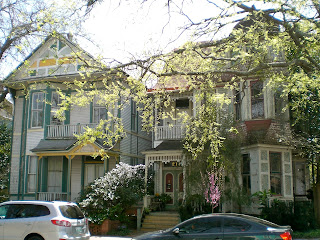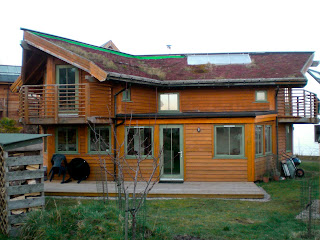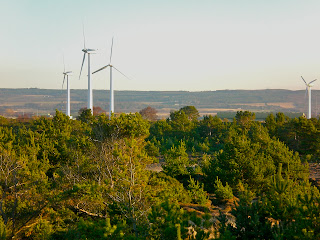Time for a quick update I think - although it's only a fortnight since my last post, several people have contacted me wondering if I'm OK as I haven't written in a while. I very much appreciate the concern behind this, but in this case it stems from a very welcome week of rediscovering life outside of cancer and health concerns!
I'm very glad to say that I've been recovering well from the SIRT treatment, and the side-effects I worried about haven't really been an issue. If anything, it's been the long-familiar effects of the chemo which are the nuisance - I haven't really noticed anything extra from the radiation. But as it's now 4 weeks since the last chemo, those are gradually but systematically improving: I have more energy, the nosebleeds from low platelets have stopped, I no longer feel cold to the bones all the time regardless of the weather, and I spend less time fishing hair from the plughole after washing my hair; and all these things are brilliant for the morale. The neuropathy in my fingers is the one thing which hasn't improved, but my alternative doctor in Sussex has recommended a supplement (alpha lipoic acid, an antioxidant which is well-established as helping counteract nerve damage, not just for people on chemotherapy but also in type 2 diabetes) so I feel much less anxious about that than before. Of course I'll still have to wait and see whether it recovers, but I'm not focused on it and worrying like I was before.
The other thing which has made a difference is that, following the SIRT, I have to take steroids for a month (in a decreasing dose throughout that period). In many ways I hate steroids, as they give a kind of brittle, wired sensation which can make it hard to relax or sleep, but I think they've boosted my mood considerably, as well as giving me the energy to talk animatedly with the lovely friends and family who have come and visited me during this recuperation phase. They also stimulate the appetite, and although my sense of taste is pretty poor still from the chemo, which makes eating fairly unrewarding, it's been great to be able to eat decent portions and to have an incentive to eat. It sounds a small thing, but it's really broken that very negative association I'd been feeling with food over the past 4 months, which had made every meal time a chore, a struggle and a burden because of the discomfort and inflammation in my stomach and intestinal tract. And of course, eating more gives extra energy in itself.
So I'm feeling considerably better than I was a fortnight ago. I'm beginning to realise just how stressful March was, with the lack of information about the SIRT, the uncertainty about whether I'd make it to the States for the wedding, the physical toll of travelling, and the fears about how I'd cope with the radiation treatment when I was in such a depleted state after 10 cycles of chemo. It was very tough, and trying to prepare myself for up to 6 weeks of convalescence when I already felt exhausted was a pretty bleak prospect. Now that it's all over, and I've tolerated it so much better than I'd expected, and the chemo is working itself out of my system, I feel a huge sense of relief.
I know at some point I'll have to face finding out whether SIRT has worked in stabilising the tumours, and to deal with there being no more medical options left - but that's not for another couple of months yet, so I've now got a window where I can actually enjoy life again. Now that I'm coming out of it, I can see how throughout the chemo my "normal" was feeling a bit rubbish, and when you're not feeling great physically it's almost impossible (in my view) not to feel a bit low mentally too. It's only now, when I've started to actually find myself thinking "ooh, sunny day, how lovely", or "maybe I'll do x y z that I've procrastinated over for so many weeks / months" that I can see how depleted I've been and what a struggle it's been. (Of course, my usual caveat: I know very well that many many people have a much harder time on chemo than I've had, with serious health complications and painful and / or distressing symptoms - all the same, that doesn't diminish what it's been like for me.)
I can also see now to what extent my world had shrunk down to medical and health appointments, keeping up with close friends, and making it through orchestra rehearsals - but even within that, every day was an ongoing series of anxious decisions - what to eat; whether I could face another cup of green tea to get up to my required 2 litres of fluids a day; whether the positives of seeing a friend and feeling cheered up outweighed the negatives of being tired by the effort of socialising; whether I should distract myself with the easy options of reading or watching TV or do nurturing things like writing my journal or meditating. Running through everything there were endless "shoulds" and worries about choosing the right thing. I'll say more about all this in another post, as it's something I've been thinking about a lot.
But for now, even though I still don't have a huge amount of energy, I'm aiming to lighten up and enjoy things in a way that I just couldn't during the chemo months. Of course I'm not the only person who's found this a long, dark, cold winter - but the metaphorical elements of new light, life and energy appearing with the spring has a particular resonance for me this year. I haven't been doing anything special, and nothing's dramatically different externally, I've simply been able to take pleasure in normal activities, and be interested in life again. Of course there are still days when I'm weary, stressed, low or frustrated, but it's just fantastic also to have times when I find myself spontaneously feeling uplifted, or enthusiastic, or humorous, or optimistic, for no particular reason. I like it!
And even more precious new life....
 |
| Xavier, my friend Sheila's son, born in February |
 |
| My cousin Amanda and her husband Jon's new baby, Freddy, born 3 weeks ago |




































